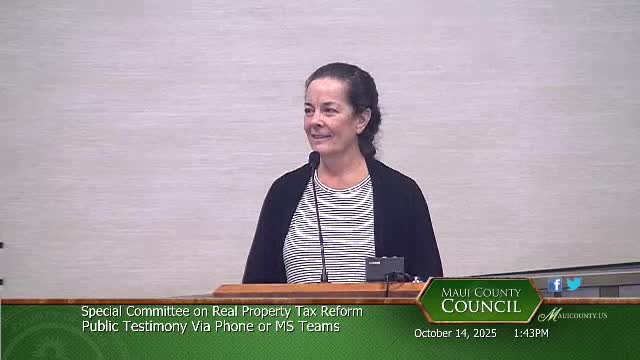Committee debates new vacant‑residential tax class; discussion deferred for more work
Get AI-powered insights, summaries, and transcripts
Subscribe
Summary
Bill 143, which would create a separate vacant residential real property tax class, drew mixed testimony and technical questions at the Oct. 14 committee meeting. The committee deferred action to allow staff and departments to develop refinements and data.
Maui County councilmembers and staff debated whether to create a new property tax class for vacant residential land during the Oct. 14 Real Property Tax Reform Special Committee meeting. The item, Bill 143 (2025), would establish a distinct vacant‑residential classification for parcels zoned residential or rural.
Rochelle Thompson, a landowner, testified that the current non‑owner‑occupied classification does not fit unimproved vacant lots because the non‑owner‑occupied definition references property "improved with a dwelling." Thompson said she owns a vacant parcel in Makawao and is paying more than $4,200 a year despite having no improvements: "Vacant land obviously is not improved with a dwelling." She recommended either removing the phrase "improved with a dwelling" from the non‑owner‑occupied definition or creating a new vacant‑land category.
Tom Crowley, a committee resource, said Maui previously had an "unimproved residential" class (eliminated in 2010) and urged the committee to clarify intent before creating a new class: "Is it to set a higher rate? ... Or is it to set a lower rate to help someone like Ms. Thompson?" Crowley also suggested considering apartment‑zoned vacant parcels and whether they should be included.
Real Property Tax Division Administrator Carrie Stockwell said valuation practice already adjusts assessed values for lack of infrastructure such as water; parcels without water or other infrastructure are typically valued lower. "When something didn't have water and it couldn't be developed, we would adjust it for no water," she said. Finance staff warned that a blanket exemption or a new category could interact with assessment practice and might risk "double dipping."
Several presenters urged clarity about the bill's policy objective. Evan Durst said he feared taking steps that could coerce property owners to develop land, calling forced economic pressure "an unnecessary intrusion into the landowner's property rights." Testimony also raised questions about whether rural vacant land should instead be treated the same as agriculture.
Committee members discussed possible alternatives including grouping apartment‑zoned vacant parcels with a new classification, treating rural parcels as agriculture, or simply removing "improved with a dwelling" from the current code. Member Rollins Fernandez said she had discussed the proposal with finance but brought it to committee for broader review because staff and members had different perspectives.
No final vote was taken. A motion to approve was made and seconded, but members later withdrew the second and elected to defer the item for further work with department staff and corporation counsel so the committee can consider data, drafting and administrative impacts.
The committee asked finance for data on apartment‑zoned vacant parcels in high‑value areas and asked staff to develop refined language and intent for a future meeting.
